Key takeaways:
- Taxation laws, especially 280E, complicate cannabis businesses by preventing ordinary expense deductions, highlighting the need for specialized tax planning.
- Understanding and adapting to various cannabis tax types, such as excise and sales taxes, is crucial for maintaining profitability and competitiveness.
- Clear communication about tax-inclusive pricing can foster customer trust and loyalty despite potential price increases due to taxes.
- Meticulous record-keeping and reliance on tax professionals are vital to avoiding costly errors and managing compliance effectively.
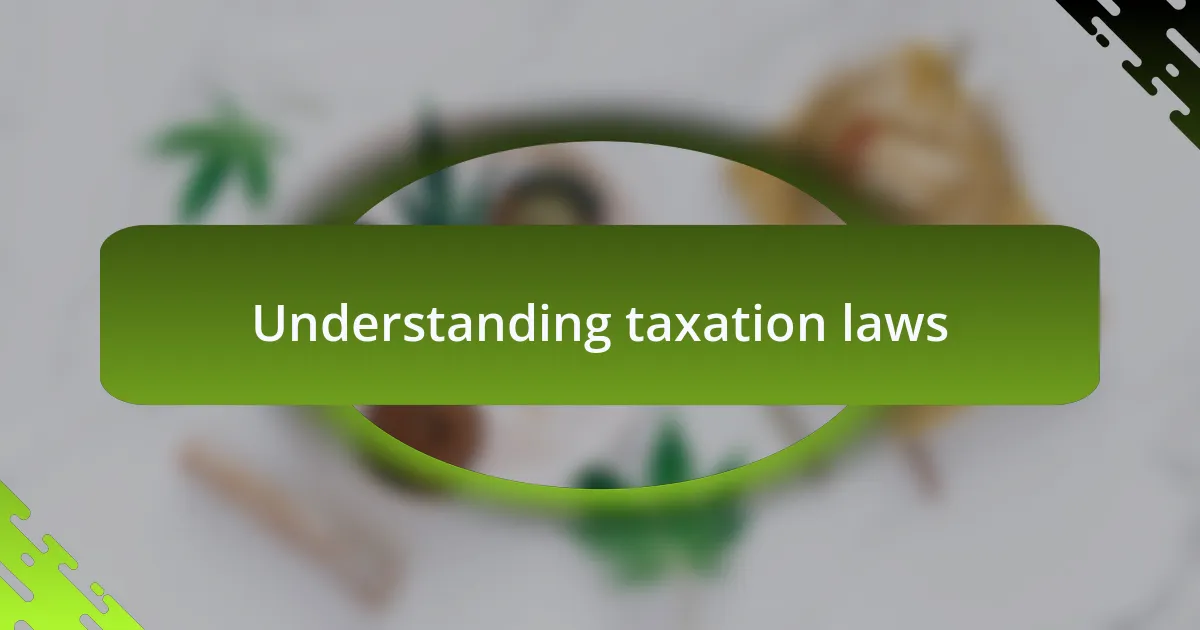
Understanding taxation laws
Taxation laws can be quite intricate, especially for burgeoning industries like cannabis retail. I remember the first time I sat down to decode these laws; it felt like solving a complex puzzle. The layers of local, state, and federal regulations can easily overwhelm someone just trying to understand their obligations. Have you ever found yourself staring at a tax code and wondering how it could be clearer?
One of the most surprising aspects I’ve come across is the stark difference in tax treatment for cannabis compared to other businesses. For example, 280E of the Internal Revenue Code prevents cannabis businesses from deducting ordinary business expenses on their federal tax returns. This was a real eye-opener for me. I initially thought that running a retail operation meant I could manage my expenses like any other retailer, but the reality was quite the opposite, teaching me that tax planning is not just beneficial—it’s essential.
Additionally, the ongoing changes in taxation laws can create a sense of uncertainty. It feels as if just when I have a grasp on one aspect, new regulations emerge. This constant flux forces business owners to stay vigilant and up-to-date, often relying on experts to navigate the complexities. How often do we hear about changes that could significantly impact our bottom line? For me, this has reinforced the importance of building a reliable tax advisory team that understands the nuances of this unique market.
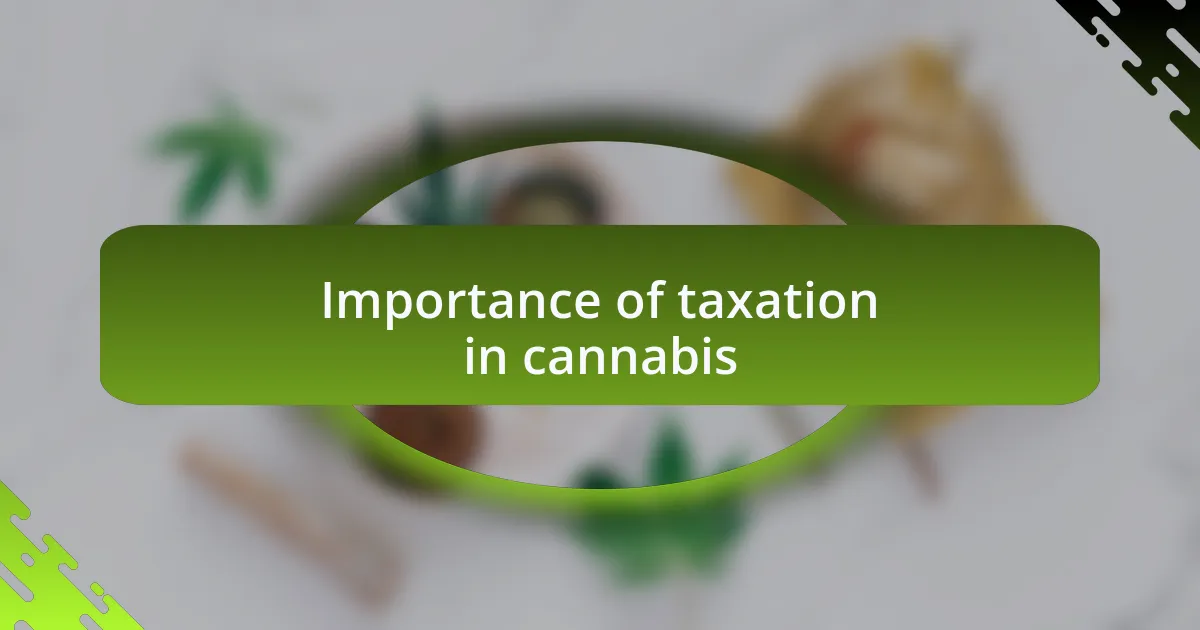
Importance of taxation in cannabis
The importance of taxation in cannabis cannot be overstated. I remember the first time a tax bill hit my desk—it felt more like a personal attack than a financial obligation. Realizing how these taxes are structured, especially with heavy excise taxes, made me understand that every cent counts in this industry. Have you ever considered how these taxes can impact the pricing strategies of cannabis products? They indeed have a profound influence on our market competitiveness and consumer behavior.
Understanding taxation is crucial not just for compliance but also for strategic planning. I’ve found that leveraging tax credits or addressing potential liabilities can make a tangible difference in financial outcomes. The reality is that effective tax management can lead to significant savings, providing us with more resources to invest back into our businesses. It’s almost like a hidden power—what if you could turn tax obligations into opportunities for growth?
Ultimately, the taxation landscape shapes the very framework of the cannabis industry. I often reflect on how these regulations dictate not only our bottom line but also our ability to thrive and innovate. With so many moving parts, I can’t help but ask: how can we as retailers adapt and respond effectively to taxation changes? It’s a constant balancing act that keeps me on my toes, and I believe it’s essential for anyone looking to succeed in this space.

Overview of cannabis retail regulations
Navigating cannabis retail regulations can feel like traversing a maze. Each state has its own unique set of rules, from licensing requirements to operational mandates. I remember sifting through a lengthy stack of documents to ensure compliance—what a headache! I found myself questioning, “How can we possibly keep up with all this?” Yet, understanding these regulations is not just about avoiding pitfalls; it’s about crafting a sustainable business model.
The challenge often lies in the intricate web of local, state, and federal laws. For instance, I had to adapt my inventory practices based on a sudden regulation change regarding how products must be labeled. It was a scramble, but it highlighted the importance of staying informed and flexible. How often do we consider the regulations as not just barriers but as frameworks that can define our operational strategies?
Moreover, compliance extends beyond initial licensing—ongoing regulatory changes can alter the landscape overnight. I once found out about a new regulation during a sales meeting, and I recall feeling that initial wave of panic. But instead of succumbing to stress, I used that moment to rally our team around adapting swiftly. Isn’t it fascinating how each new regulation can also present fresh opportunities for innovation and growth?

Different types of cannabis taxes
When it comes to cannabis taxation, I quickly learned that several types can significantly impact the bottom line. One of the most common is the excise tax, which is levied on the sale of cannabis products. I recall the first time I calculated this tax; seeing the percentage cut into our profits was a stark reminder of how crucial it is to fully understand these financial obligations.
Additionally, many areas impose sales taxes specifically for cannabis purchases. This can vary wildly depending on the state, and I often found myself double-checking local regulations to ensure compliance. Have you ever had to adjust your pricing strategy to accommodate such taxes? It can feel overwhelming, but it’s imperative to incorporate these costs into your planning to maintain profitability.
Finally, there are sometimes local taxes that can stack on top of state taxes, creating a complex matrix that demands attention. I remember working with a financial advisor who emphasized the importance of staying on top of these varying rates; otherwise, we risked running into major financial challenges. Isn’t it interesting how navigating this landscape forces us to be not only compliant but also strategic in our operations?
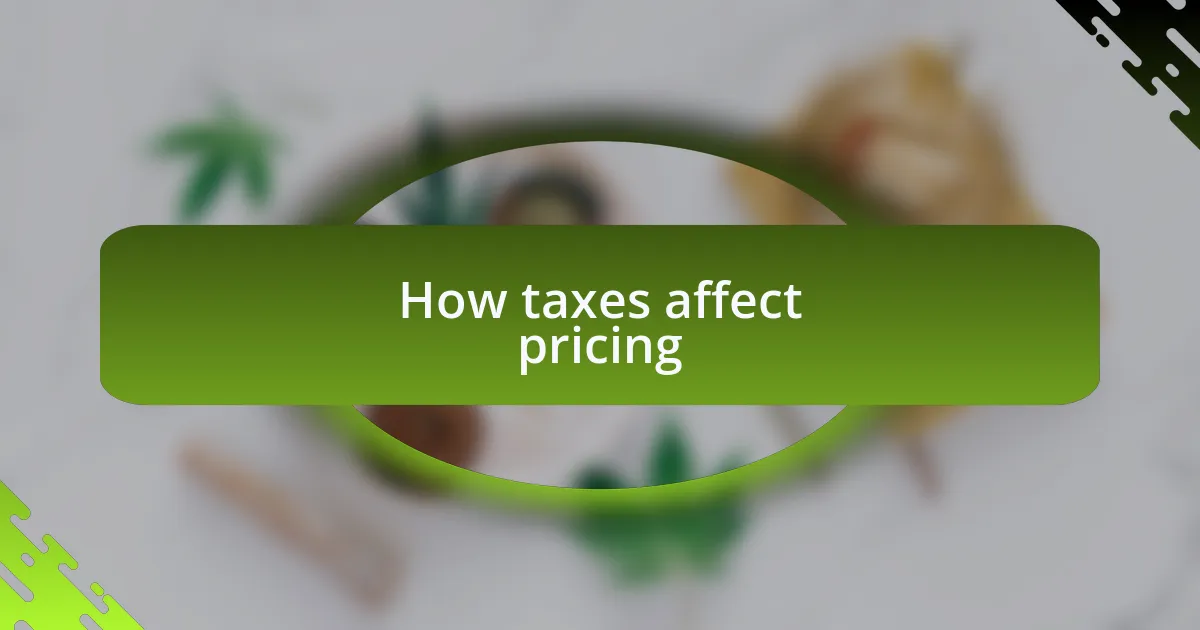
How taxes affect pricing
When I first priced my products, I had to grapple with how taxes shifted our price points. I distinctly remember a day when I calculated the impact of both sales and excise taxes—it was eye-opening to see how much more customers would ultimately pay. Have you ever felt the sting of tax-adjusted pricing? It can be frustrating initially, but understanding its necessity helps frame it in a different light.
Every adjustment to our pricing strategy felt like a mini-update to our business model. I vividly recall an instance where a small change in local tax rates nudged our prices up, catching me by surprise. I thought, “How can I explain this to my customers without losing their loyalty?” In those moments, clear communication became essential; I learned to emphasize quality over price, assuring customers that our products were worth the tax-inclusive cost.
Ultimately, I discovered that taxes aren’t just numbers on a spreadsheet; they’re a vital part of how I manage customer expectations. The way I positioned our products included transparency about these costs—an approach that, surprisingly, fostered trust with our clientele. Have you taken steps to communicate these nuances? It’s all part of creating a respectful and informed dialogue with the community we serve.
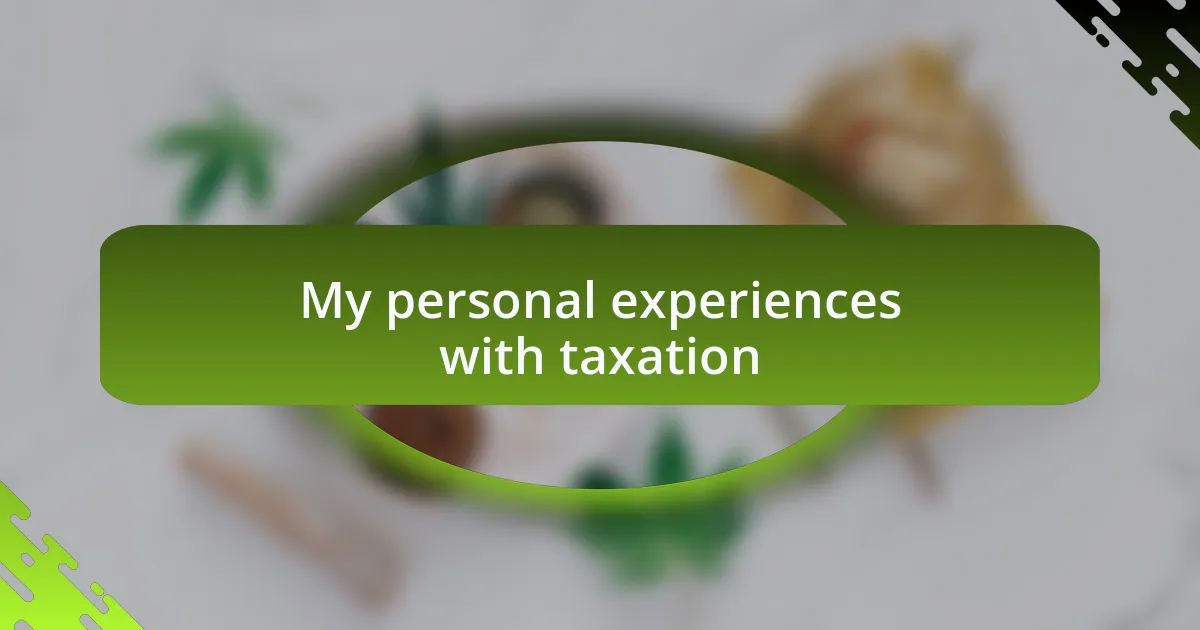
My personal experiences with taxation
Navigating the complexities of taxation was a pivotal experience for me as a cannabis retailer. I remember the first time I worked on our quarterly tax reporting; the sheer volume of paperwork felt overwhelming. Did I miss any deductions? The fear of making mistakes loomed large, so I sought advice from tax professionals who specialized in cannabis, realizing that their insights were invaluable.
There was a particularly stressful moment during tax season when I realized that I had underestimated the federal excise taxes on our products. The panic set in as I calculated how it would affect our bottom line. Have you ever had that sinking feeling when numbers just don’t add up? It pushed me to revamp my approach, setting up a detailed tracking system for expenses and taxes to avoid such surprises in the future.
Looking back, I see those tax experiences as foundational to my growth as a business owner. Every challenge prompted me to develop a deeper understanding of both local and federal taxation laws, which is crucial in this industry. Have you ever felt that your challenges made you stronger? Embracing those lessons has not only improved my operational efficiency but also transformed my approach to financial planning.
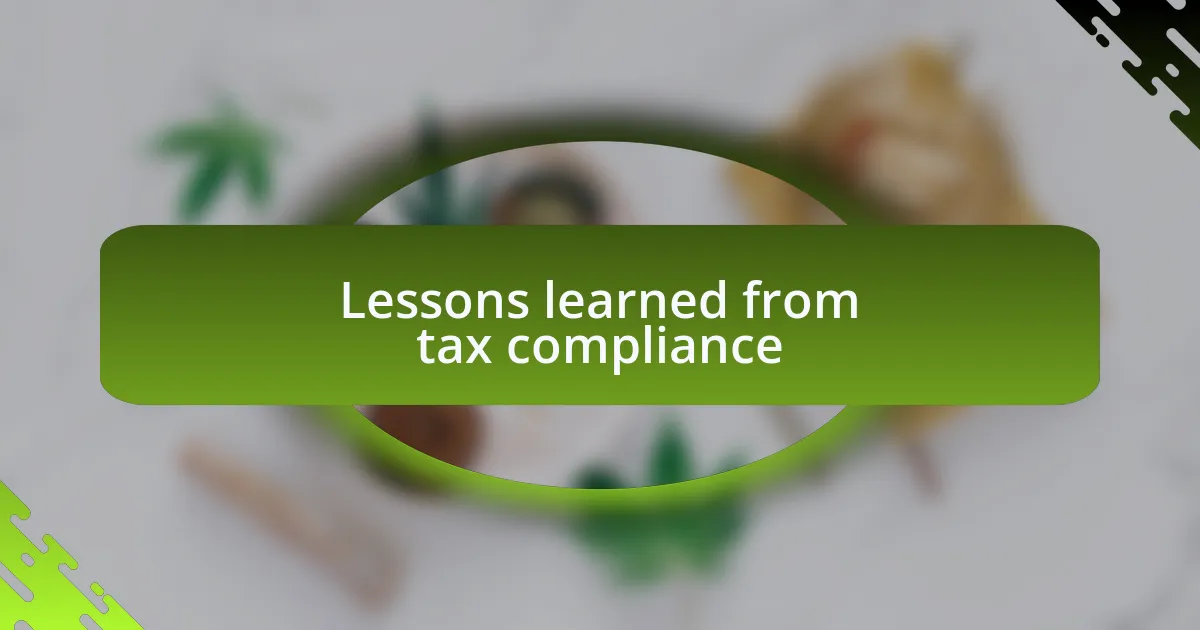
Lessons learned from tax compliance
Understanding tax compliance has been a journey filled with eye-opening lessons. One particularly memorable instance was when I miscalculated my sales tax obligations for a promotional event. It wasn’t just a few dollars – it turned into a significant shortfall that I had to rectify while also managing customer expectations. Have you ever faced a moment that made you realize the true weight of your responsibilities?
I also learned that meticulous record-keeping isn’t just a recommendation; it’s a necessity. During one audit, my lack of organized documents led to a frantic scramble to find receipts. The stress of that experience taught me the importance of a dedicated bookkeeping system. Did you know that a well-structured record could save you from sleepless nights when tax season rolls around?
Reflecting on these compliance challenges, I now see them as stepping stones rather than obstacles. Each hurdle forced me to confront my weaknesses in accounting knowledge, ultimately shaping me into a more informed and proactive business owner. Isn’t it fascinating how difficulties can mold our professional paths? That shift in mindset has not only eased my tax-related anxieties but has empowered me to navigate the financial landscape of the cannabis industry with confidence.